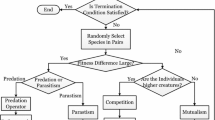Abstract
This paper presents a systematic approach to co-evolution that allows concise and unified expression of all types of symbiotic relationships studied in ecology. The resulting Linear Model of Symbiosis can be easily added to any regular Genetic Algorithm. Our model helps prevent premature convergence to a local optimum by maintaining the genetic diversity in a population. Our experiments show that co-evolutionary Genetic Algorithms outperform regular Genetic Algorithms on some difficult problems including one (Holland's Royal Road function) which was specifically designed to highlight the strengths of a regular Genetic Algorithm.
Preview
Unable to display preview. Download preview PDF.
Similar content being viewed by others
References
P. J. Angeline and J. B. Pollack. Competitive Environments Evolve Better Solutions for Complex Tasks. In Fifth International Conference on Genetic Algorithms, pages 264–270, 1993.
J. E. Baker. Adative Selection Methods for Genetic Algorithms. In J. J. Grefenstette, editor, International Conference on Genetic Algorithms: ICGA'85, pages 101–106, 1985.
K. Deb and D. E. Goldberg. An Investigation of Niche and Species Formation in Genetic Function Optimization. In J. D. Schaffer, editor, International Conference on Genetic Algorithms. ICCA'89, pages 42–43, 1989.
W. D. Hillis. Co-evolving parasites improve simulated evolution as an optimization procedure. In Artificial Life II, SPY Studies in the Sciences of Complexity, volume 10, pages 313–323.
J. H. Holland. Royal roads functions. Internet Genetic Algorithms Digest, 7:issue 22, August 12 1993.
P. Husbands and F. Mill. Simulated Co-Evolution as The Mechanism for Emergent Planning and Scheduling. In Fourth International Conference on Genetic Algorithms, pages 264–270, 1991.
D. Lewis. Symbiosis and mutualism. In The Biology of Mutualism: Ecology and Evolution, pages 29–39.
J. Paredis. Co-evolutionary Constraint Satisfaction. In H. S. Y. Davidor and R. Männer, editors, Parallel Problem Solving from Nature — PPSN III, pages 46–55, Berlin, Oct 1994. Springer-Verlag.
M. A. Potter and K. A. DeJong. A Cooperative Coevolutionary Approach to Function Optimization. In H. S. Y. Davidor and R. Männer, editors, Parallel Problem Solving from Nature — PPSN III, pages 249–257, Berlin, Oct 1994. Springer-Verlag.
K. Sims. Evolving 31) Morphology and Behavior by Competition. In It. Brooks and P. Maes, editors, Artificial Life IV, pages 28–39, 1994.
M. Starr. A generalized scheme for classifying organismic associations. Symposia of the Society for Experimenlal Biology, 29:1–20, 1975.
D. Whitley, K. Mathias, S. Rana, and J. Dzubera. Evaluating evolutionary algorithms. Artificial Intelligence, 85:1–32, 1996.
X. Yao and P. J. Darwen. Evolving Robust Strategies for Iterated Prisoner's Dilemma. In X. Yao, editor, Progress in Evolutionary Computation, pages 276–292, 1994.
Author information
Authors and Affiliations
Editor information
Rights and permissions
Copyright information
© 1998 Springer-Verlag Berlin Heidelberg
About this paper
Cite this paper
Morrison, J., Oppacher, F. (1998). Maintaining genetic diversity in genetic algorithms through co-evolution. In: Mercer, R.E., Neufeld, E. (eds) Advances in Artificial Intelligence. Canadian AI 1998. Lecture Notes in Computer Science, vol 1418. Springer, Berlin, Heidelberg. https://doi.org/10.1007/3-540-64575-6_45
Download citation
DOI: https://doi.org/10.1007/3-540-64575-6_45
Published:
Publisher Name: Springer, Berlin, Heidelberg
Print ISBN: 978-3-540-64575-7
Online ISBN: 978-3-540-69349-9
eBook Packages: Springer Book Archive




